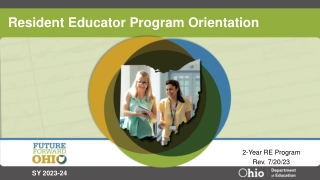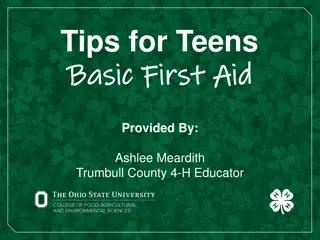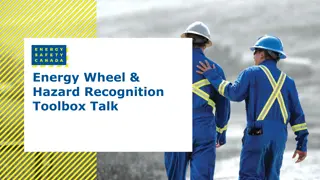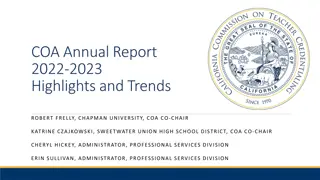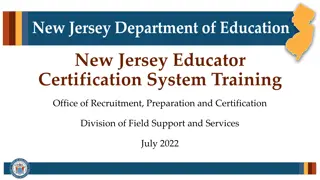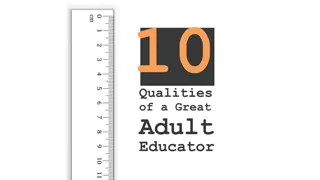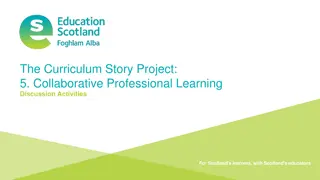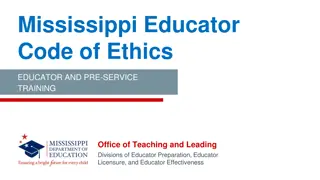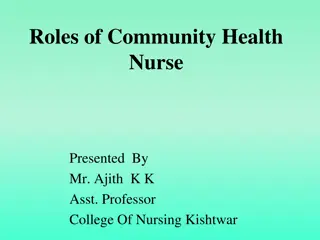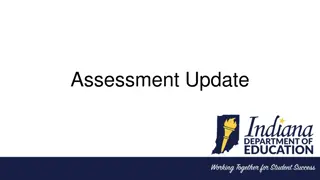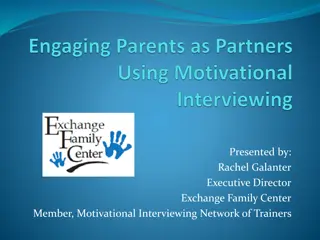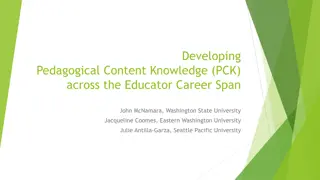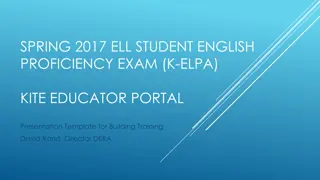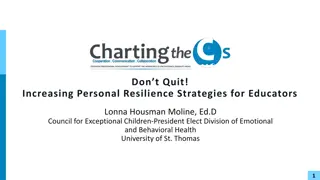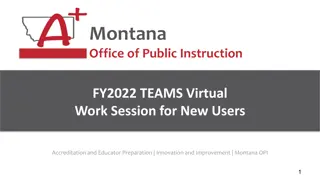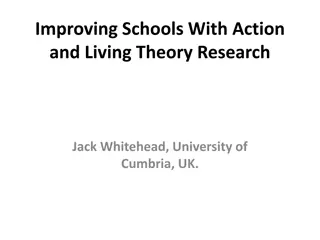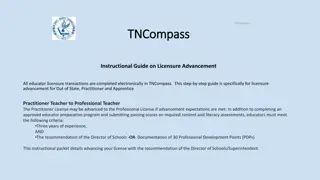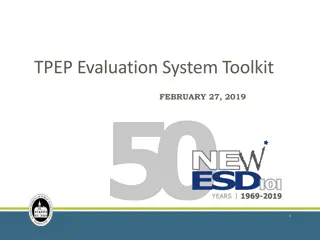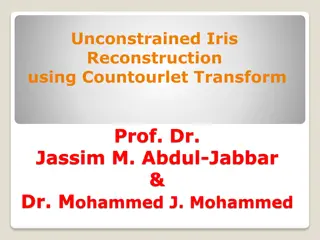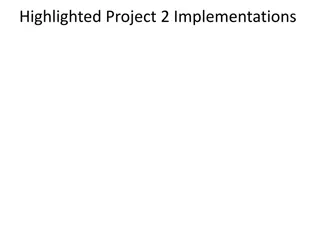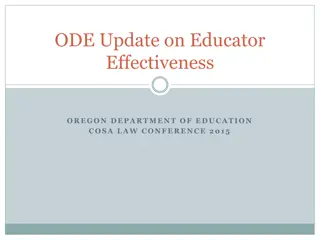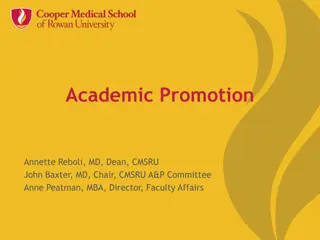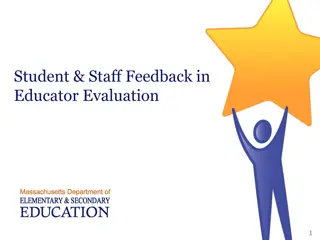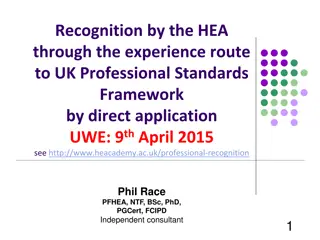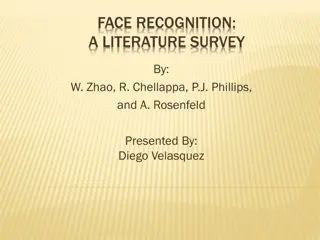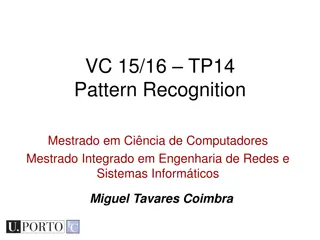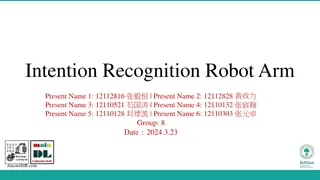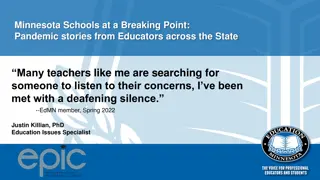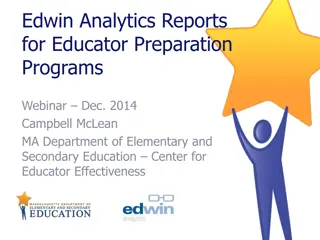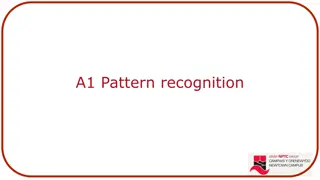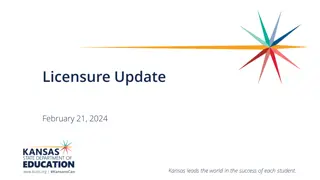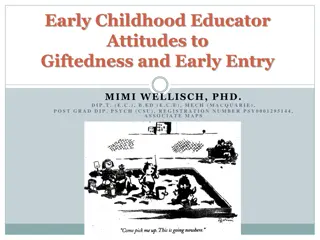Resident Educator Program Orientation
This orientation program provides information on the Ohio Resident Educator Program, including topics such as teacher residency and induction programs, mentoring principles, and the Resident Educator Summative Assessment (RESA). It also discusses the different types of Resident Educator Licenses and
1 views • 26 slides
Transforming Educator Preparation in Arizona
Arizona Coalition for Educator Preparation and Practice (ACEPP) is dedicated to improving educational outcomes by focusing on students with disabilities and enhancing professional learning for educators. Their initiatives include aligning state reading initiatives with High-Leverage Practices (HLPs)
0 views • 20 slides
The Role of Artifacts and Evidence in Educator Evaluation and Support
Exploring the role of artifacts and evidence in educator evaluation, this content covers the three categories of evidence required by the Oregon Framework. It delves into the efficient process that reduces redundancy, essential components of SLG goals, and the types of evidence relevant to professio
0 views • 15 slides
Teen Basic First Aid Tips by Ashlee Meardith Trumbull County 4-H Educator
Learn basic first aid tips for teens provided by Ashlee Meardith Trumbull County 4-H Educator. The tips cover handling bug/insect bites, animal bites, poisoning incidents, burns, cuts, and scrapes. Each section includes common symptoms and appropriate first aid measures to take in case of emergencie
4 views • 11 slides
Theresa S. Clark - Diabetes Educator Program Coordinator
Theresa S. Clark, MS, RD, LD, CDE, BC-ADM, is a dedicated Diabetes Educator and Program Coordinator at the Diabetes Resource Center in Hopkinsville, KY. She specializes in insulin therapies and teaches patients about insulin administration, carbohydrate counting, and mealtime insulin dosing. Certifi
1 views • 50 slides
Energy Wheel & Hazard Recognition Toolbox Talk
Hazard recognition is crucial for safety in all activities. Hazards can range from gravity and motion to mechanical and chemical risks. Failure to identify hazards can lead to incidents, making tools like the Energy Wheel key for improving recognition. The Energy Wheel enhances hazard recognition by
2 views • 10 slides
California Educator Preparation Programs: Highlights and Trends 2022-2023
The California Educator Preparation Programs Annual Report for 2022-2023 showcases key highlights and trends in the field. It includes insights on accreditation status, site visits, distribution of institutions, largest number of preparation programs, and members of the Committee on Accreditation (C
0 views • 20 slides
New Jersey Educator Certification System Training Overview
The New Jersey Educator Certification System (NJEdCert) has replaced the Teacher Certification Information System (TCIS) to streamline the certification process. This system offers real-time updates, automated notifications, and enhanced reporting capabilities for educators, colleges, and school dis
0 views • 62 slides
Qualities of a Great Adult Educator
Discover the essential traits that make a great adult educator, including being creative, wise, empathetic, dedicated, humble, collaborative, persistent, organized, consistent, and courageous. Specific feedback is highlighted as crucial, creating intrinsic motivation and outlining reflective points
0 views • 39 slides
Transforming Lives Through Collaborative Professional Learning in Scotland
The Curriculum Story Project 5 offers discussion and practical activities for Scotland's educators to enhance interdisciplinary learning and collaborative professional development. It emphasizes the importance of creating dedicated time and space for collaboration, exploring new strategies for educa
0 views • 10 slides
Mississippi Educator Code of Ethics and Training Overview
The Mississippi Educator Code of Ethics aims to promote the health, safety, welfare, discipline, and morals of students and educators. Ethical training plays a crucial role in preparing administrators and teachers to make professional decisions. Violations of the code can be reported to the Mississi
0 views • 79 slides
Roles of Community Health Nurse: Presented by Mr. Ajith K.K.
Community Health Nurses play various roles including Clinician, Educator, Advocate, Manager, Collaborator, Leader, and Researcher. The Clinician role focuses on providing holistic care, health promotion, and wellness services to individuals, families, groups, and populations. The Educator role invol
1 views • 24 slides
Automatic Recognition of Higher Education Qualifications Treaty Summary
Importance of automatic recognition of qualifications in higher education has been emphasized, leading to initiatives like the Treaty on Automatic Recognition of Higher Education Qualifications by Baltic and Benelux states. This treaty aims to enhance mutual trust, transparent recognition, and contr
1 views • 8 slides
ILEARN Assessment Update and Educator Resources Release
Updates on the ILEARN assessment process including draft blueprints, item specifications, educator involvement, and next steps. Get ready for the Item Acceptance Review in April followed by the release of resources on May 15, 2018 for educators and students. Explore new items aligned with Indiana st
0 views • 4 slides
Meet Rachel Galanter: Motivational Interviewing Expert and Parenting Educator
Rachel Galanter, MPH, a seasoned Executive Director at Exchange Family Center, is a certified Parenting Educator with extensive experience in working with children, youth, and families. She utilizes Motivational Interviewing techniques along with various proven models to help families overcome barri
0 views • 57 slides
Developing Pedagogical Content Knowledge (PCK) for Educator Excellence
Explore how Developing Pedagogical Content Knowledge (PCK) throughout an educator's career enhances student learning and growth. Learn strategies to integrate content knowledge, pedagogy, and socio-emotional learning effectively. Discover the progression of teacher development from recruitment to le
2 views • 29 slides
KITE Educator Portal Training Guide for K-ELPA Coordinators
Access the KITE Educator Portal for the SPRING 2017 ELL Student English Proficiency Exam training. Learn how to log in, manage user roles, navigate the portal, and access important information for building test coordinators. Follow the steps outlined to ensure smooth coordination and efficient utili
0 views • 15 slides
Don't Quit!: Strategies for Educator Resilience
This session focuses on increasing personal resilience for educators, addressing the stress and challenges they face in their roles. Explore strategies, research on teacher retention, and interventions to support educator well-being. Learn about common stressors, resilience techniques, and ways to m
0 views • 57 slides
Montana OPI Virtual Work Session for New Users: Accreditation & Educator Preparation
Montana Office of Public Instruction (OPI) hosts a virtual work session for new users focusing on accreditation and educator preparation for the FY2022 TEAMS program. The session covers topics such as the accreditation process for the upcoming academic year, user roles and screens in TEAMS, SEID cre
1 views • 39 slides
Understanding Levels of Object Recognition in Computational Models
Explore the levels of object recognition in computational models, from single-object recognition to recognizing local configurations. Discover how minimizing variability aids in interpreting complex scenes and the challenges faced by deep neural networks in achieving human-level recognition on minim
0 views • 29 slides
Enhancing Professional Development and Educator Recognition in Cyprus
The discourse focuses on improving professional development in Cyprus, shifting towards school-based training and recognizing the expertise of Master Educators. The discussion delves into the need for structured practices, the evolving landscape of teacher training, and the challenges faced by auton
0 views • 12 slides
Guide to Licensure Advancement for Educators in TNCompass
This instructional guide provides step-by-step information on advancing educator licensure from Practitioner to Professional in TNCompass. Key requirements include three years of experience, completion of an approved educator preparation program, passing required assessments, and either a recommenda
0 views • 18 slides
Effective Educator Evaluation System Toolkit for Districts
The TPEP Evaluation System Toolkit provides a comprehensive guide for leading educator evaluation systems in schools and districts. It covers key elements such as district leadership, professional learning, and self-assessment opportunities. The toolkit aims to enhance educator effectiveness and pro
0 views • 20 slides
Enhancing Iris Recognition with Circular Contourlet Transform
Iris recognition is a reliable biometric identification method due to the iris's unique properties. By incorporating the Circular Contourlet Transform (CCT) into the classical iris recognition algorithm, the feature extraction process can be enhanced to improve recognition rates under unconstrained
0 views • 14 slides
Enhancing Educator Success: The WRU Educator Framework in Action
WRU Education aims to empower a successful educator workforce through positive learning experiences and a robust Educator Framework. By focusing on recruitment, retention, and development, WRU ensures a thriving workforce through accessible learning programs. The implementation of the EAST principle
0 views • 19 slides
Exploring Visual Vocabulary Trees for Image Recognition
In this detailed content, the implementation of Vocabulary Trees for image recognition is discussed. The structure's complexity, efficiency in processing a large number of images, and issues related to instance recognition are explored. The text delves into the benefits of using vocabulary trees, ch
0 views • 27 slides
Oregon Department of Education Update on Educator Effectiveness - 2015 Conference Highlights
Explore key topics from the 2015 COSA Law Conference, including educator effectiveness updates, student growth percentiles, norms for collaboration, learning objectives, ESEA waiver insights, and more.
0 views • 37 slides
Guidelines for Academic Promotions in Medical School
Academic promotions in a medical school are crucial for recognizing achievements, maintaining competitiveness, and serving the institution's interests. Promotion criteria include teaching effectiveness, scholarly activity, clinical service, and active participation in various communities. Meritoriou
0 views • 47 slides
Importance of Student and Staff Feedback in Educator Evaluation
Student and staff feedback plays a crucial role in educator evaluation, providing valuable insights into areas of strength and growth. Informed by evidence such as surveys, observations, and artifacts, feedback helps educators tailor their practice, fostering two-way communication and professional d
0 views • 14 slides
Educator Preparation & Pathways (EP&P) Overview and Staff Information
Discover an overview of the Educator Preparation & Pathways (EP&P) program, including details about the EP&P Committee, Oregon Administrative Rule Chapter 584, and staff contacts. Meet key personnel such as Dr. Shara MonDragon, Kirsten Plumeau, Kristin Rush, Dr. Mark Van Ryzin, Richelle Krotts, and
0 views • 5 slides
Understanding HEA Professional Recognition in the UK Higher Education Sector
Recognition by the Higher Education Academy (HEA) through the experience route to the UK Professional Standards Framework (UKPSF) is a valuable achievement for higher education practitioners. This presentation by Phil Race and Sally Brown highlights the benefits of HEA recognition, the evolving syst
0 views • 79 slides
Face Recognition: A Comprehensive Literature Survey
This literature survey delves into the importance and challenges of face recognition technology, covering topics such as biometrics, human face recognition, variations in pose and illumination, early and modern approaches, as well as the evaluation of face recognition systems. The need for face reco
0 views • 30 slides
Tau Beta Sigma Sorority Jewelry Collection - Spring 2013
Explore the exquisite collection of Tau Beta Sigma sorority jewelry, including the Prospective Member Pin, TB Recognition Pin, Enameled Recognition Pin, Crown Pearl Badge, Official Key, Recognition Bar, and Life Member Pin. Each piece holds special significance within the sorority, symbolizing commi
0 views • 11 slides
Understanding Pattern Recognition in Computer Science
Dive into the world of pattern recognition, where data is analyzed to make decisions and identify features. Explore statistical pattern recognition, classifiers, and the process of recognizing patterns in images. Learn how computers see and interpret visual data, and the challenges of representing k
0 views • 43 slides
Assistive System Design for Disabilities with Multi-Recognition Integration
Our project aims to create an assistive system for individuals with disabilities by combining IMU action recognition, speech recognition, and image recognition to understand intentions and perform corresponding actions. We use deep learning for intent recognition, gesture identification, and object
0 views • 14 slides
Minnesota Schools at a Breaking Point: Educator Voices Amidst Pandemic Challenges
Educators in Minnesota are facing unprecedented challenges, including systemic failures, unsafe working environments, and educator attrition. The Educator Policy Innovation Center highlights the severity of the situation, emphasizing the voice of educators and the impact on students. National trends
0 views • 10 slides
Edwin Analytics Reports for Educator Preparation Programs Overview
Edwin Analytics is a comprehensive platform housing analytical tools for educator preparation programs. It offers various reports catering to stakeholders at different levels, from superintendents to classroom teachers. The platform includes features like the Early Warning Indicator System and Posts
0 views • 24 slides
Understanding Pattern Recognition in Computational Thinking
Pattern recognition in computational thinking involves identifying common elements, interpreting differences, and predicting based on patterns. It helps simplify complex problems by recognizing similarities and characteristics shared among them. Through repetition and algorithmic processes, patterns
0 views • 6 slides
Educator Licensure Update and Program Highlights
Update on licensure requirements, upcoming deadlines, and nontraditional routes to the classroom in Kansas. Information on out-of-state licenses, mentor programs, and educator preparation accreditation. Details on limited residency licenses, teacher apprenticeship programs, and the Teacher Mobility
0 views • 27 slides
Early Childhood Educator Attitudes to Giftedness Research Overview
Early Childhood Educator Attitudes to Giftedness and Early Entry research by Mimi Wellisch, PHD, explores the impact of gifted training on educator attitudes. It discusses the evolution of attitudes, training in giftedness, and regulation requirements for young gifted children in NSW. The research c
0 views • 33 slides
